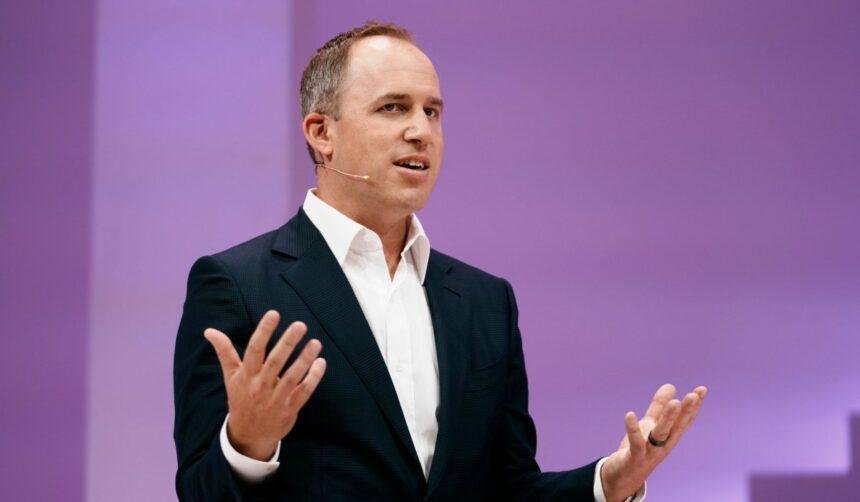OpenAI Board Chair Bret Taylor Discusses the AI Bubble: A Historical Perspective
In a recent interview with The Verge, Bret Taylor, the board chair of OpenAI and CEO of the AI startup Sierra, shared his insights on the current state of artificial intelligence (AI) and its economic implications. His remarks come at a time when the AI sector is experiencing rapid growth, raising questions about sustainability and potential financial pitfalls.
The AI Bubble: A Double-Edged Sword
Taylor was asked to weigh in on OpenAI CEO Sam Altman’s assertion that “someone is going to lose a phenomenal amount of money in AI.” Taylor agreed with this sentiment, suggesting that the industry is indeed in a bubble. However, he also expressed a sense of optimism about the transformative potential of AI, likening its trajectory to that of the internet in the late 1990s.
“I think it is both true that AI will transform the economy, and I think it will, like the internet, create huge amounts of economic value in the future,” Taylor stated. He emphasized that while the current landscape may be fraught with risks, the long-term benefits could be substantial.
Historical Context: The Dot-Com Bubble
To better understand Taylor’s perspective, it is essential to consider the historical context of the dot-com bubble that characterized the late 1990s. During this period, the rapid rise of internet-based companies led to inflated valuations and widespread speculation. Many startups, despite their initial promise, ultimately failed when the bubble burst in 2000, resulting in significant financial losses for investors.
However, Taylor pointed out that the dot-com era also laid the groundwork for the digital economy we know today. Companies like Amazon and eBay emerged from the rubble, fundamentally changing how we shop and interact online. “All the people in 1999 were kind of right,” he noted, suggesting that while many companies failed, the underlying technology and its potential were sound.
The Current AI Landscape
Today, the AI sector is experiencing a similar surge in interest and investment. From machine learning algorithms to natural language processing, AI technologies are being integrated into various industries, including healthcare, finance, and entertainment. This rapid adoption has led to soaring valuations for many AI startups, prompting concerns about a potential market correction.
Taylor’s comments resonate with a growing chorus of voices in the tech community who caution against overvaluation. As reported by various financial analysts, the influx of venture capital into AI has created an environment where some companies may not have sustainable business models. The fear is that, like the dot-com bubble, a significant correction could lead to substantial financial losses.
The Promise of AI: Economic Transformation
Despite the risks, Taylor remains optimistic about the long-term impact of AI on the economy. He believes that the technology will not only create new markets but also enhance productivity across existing sectors. For instance, AI-driven automation has the potential to streamline operations in manufacturing, reduce costs in logistics, and improve patient outcomes in healthcare.
Moreover, the integration of AI into everyday applications is expected to drive innovation. As businesses adopt AI tools, they can leverage data analytics to make more informed decisions, ultimately leading to increased efficiency and profitability. Taylor’s assertion that AI will create “huge amounts of economic value” aligns with the views of many economists who see AI as a catalyst for growth.
Navigating the Risks
While the potential benefits of AI are significant, Taylor acknowledges the need for caution. The rapid pace of technological advancement can lead to ethical dilemmas and regulatory challenges. Issues such as data privacy, algorithmic bias, and job displacement are critical concerns that need to be addressed as AI continues to evolve.
Regulatory bodies around the world are beginning to take notice. Governments are exploring frameworks to ensure that AI technologies are developed and deployed responsibly. This includes establishing guidelines for transparency, accountability, and fairness in AI systems. Taylor’s insights highlight the importance of balancing innovation with ethical considerations to foster a sustainable AI ecosystem.
Conclusion: A Cautious Optimism
Bret Taylor’s reflections on the current AI landscape serve as a reminder of the dual nature of technological advancement. While the potential for economic transformation is immense, the risks associated with overvaluation and ethical challenges cannot be overlooked. As history has shown, the path to innovation is often fraught with obstacles, but it is also paved with opportunities.
As the AI sector continues to grow, stakeholders must remain vigilant, learning from past experiences to navigate the complexities of this rapidly evolving field. Taylor’s perspective encourages a balanced view-one that recognizes both the promise and the pitfalls of AI, ultimately fostering a more informed dialogue about its future.











